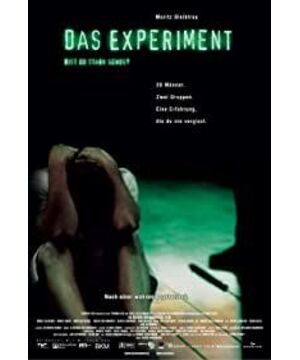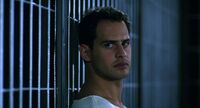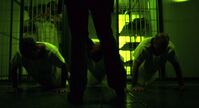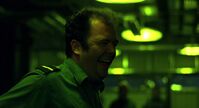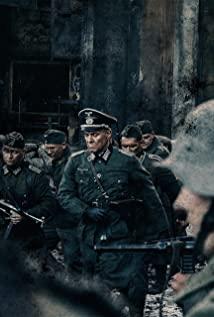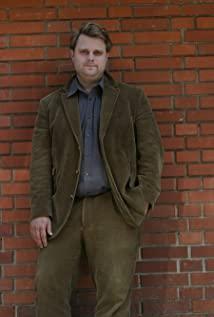"Stanford Prison Experiment", which was a research group led by American psychologist Philip Zimbardo in 1971 at the Stanford University Psychology Department Building A psychological study of human responses to captivity and the effects of captivity on authority in prisons and the behavior of superintendents was conducted in a mock prison in the basement of Stanford University students serving as guards and prisoners. Prisoners and guards quickly adapt to their roles, step by step beyond pre-set boundaries, leading to dangerous and psychologically damaging situations. A third of the guards were rated as displaying "true" sadistic tendencies, while many prisoners were emotionally traumatized, with two having to withdraw from the experiment early. In the end, Zimbardo was warned about the growing prevalence of anti-social behavior in the subject and terminated the entire experiment prematurely.
The film is basically laid out in accordance with the experiment. More than 20 subjects are locked in a simulated prison, where the rights granted to a person by the law will be temporarily lost, and there are only a few simple rules. There are two groups of people who play the roles of guards and prisoners. During the fourteen-day experiment, violence is not allowed. The prisoners are "disobedient" or do not obey the rules. The guards can be punished "appropriately". As the film progresses, when the jailer's power is expanding step by step and the prisoners' tolerance is accumulating layer by layer, the outbreak of both sides is undoubtedly an irony of the so-called rights. In the face of human desires, rights appear so fragile. When the experiment is reflected in the movie, it not only reflects the simple psychology of human beings, but also shows the evil side of human nature.
Pandora's box hides greed, violence, jealousy, pain and other evil things in human nature. People participating in the experiment, their desires are like opening Pandora's box, filling the entire experimental field. In a prison, in a narrow space, guards and prisoners do their best to oppress and resist, and no one can escape.
Violence, a rule that is not allowed, when the guards gradually discover that the prisoners need to be punished appropriately and violence is not allowed, the evil side of the heart begins to play. I have to admire the human mind. I can always think of ways to humiliate and even torture others, from ten push-ups at the beginning, handcuffing the prisoner to the prison door, shaving the prisoner's hair to show humiliation, urinating on the prisoner, and finally using equipment to beat and even kill. When the use of violence is not restricted from the beginning, that is, the red light that terminates the experiment is not turned on in the film, the perpetrator's unscrupulous desire to violence gradually expands, and violence becomes the most direct way to rule. The jailer thought that by using violence against Prisoner No. 77, the "early bird", he could kill the chickens and show the monkeys. However, the existence of violent factors is not only in the perpetrators, but also in the bones of the victims. After a limit, the power of the explosion is difficult to control. At the end of the film, the scene of prisoner No. 77's angry punching guard is the best illustration of the violent factor of the resisters. They are also human, and they are also on the edge of emotional outbursts. The violence used by prisoners is equal, the only difference is who comes first?
Desire is an eternal thing in human nature. The reason why human beings are higher than animals is that human beings can control their own consciousness and their own desires. However, when the satisfaction of desire is infinitely magnified, can human beings still follow their own moral bottom line? In the film, they, like prisoners, are members of the general population when they are not experimenting. However, after they are given a certain role, the role itself brings a certain power, a certain advantage, just It makes them expand their desires step by step, out of control. They began to learn to rule, learn to oppress, and learn to find many excuses for themselves to give prisoners "a little punishment". Such desire to rule not only brings about the depravity of human nature, but also a prelude to sin. In the face of prisoners who are in desperate need of insulin, the guards show a kind of indifference, they forget that this is just an experiment, and what they want is the satisfaction brought by the role of the jailer. Just like the sentence the prisoner said at the end of the film, "Do you still think that humans have evolved better than monkeys?" Maybe, maybe not.
The characters, also from the crowd, are more than 20 ordinary experimental subjects, and they are positioned as different roles, so the power comparison reflected by the differences in the roles has become the fuse for the development of this experiment. The power of the jailer's role lies in the management of prisoners. The prisoner's role is naturally a weaker managed. The role itself is not terrible. What is terrible is the use of the power brought by the role. Everyone plays a different role in society. After the desire and role are intertwined, how to grasp the scale is a question worth pondering. Apparently, the jailers forgot their role as experimenters, and after tasting the sweetness of "prisoner abuse", the humanity under the mask of the role began to degenerate, resulting in a tragedy of casualties.
However, in the film, most of the subjects who participated in this experiment had good intentions, which makes it difficult to discuss the issue of "nature is inherently good" and "nature is inherently evil". These good intentions have become the strongest contrast to the sins of human nature in the film. When the experiment is over, is the thoughtful expression of everyone in the car telling people: I am good? At the beginning, who would have thought that during the experiment, he would be so terrifying and sinful. When the evil devil devours the basic conscience, when the morality cannot restrain the desire of human nature, when the evil thoughts expand infinitely under the agitation of desire, everything is too late, fortunately, this is just an experiment, the red light Lights up, the moment the iron door opens, everything is over. Unfortunately, the devil in everyone's heart will never disappear with the opening of the door, and in the big experimental field of life, the inner struggle between good and evil will not end.
View more about The Experiment reviews


